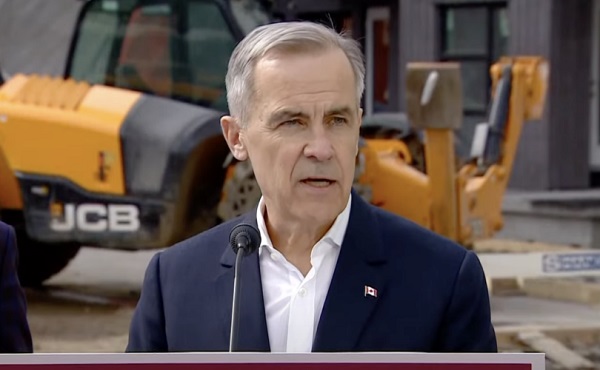Alberta
Alberta: The fuel for global growth in 2025

By Patrick Malkin
In an era defined by economic volatility and political strife, Alberta stands out as a beacon of success, outpacing many areas of North America in growth and innovation. The province’s achievements can be attributed to a combination of prudent governance, resource management, and a commitment to diversification that positions it as a model for other regions.
At the heart of Alberta’s success is its robust economy, driven primarily by its abundant natural resources. The province is rich in oil, gas, and minerals, which have historically fueled its growth. However, what sets Alberta apart is its ability to adapt and evolve. Unlike many resource-dependent regions, Alberta has not rested on its laurels. Instead, it has invested in technology and innovation to enhance its energy sector’s efficiency and sustainability. Initiatives aimed at carbon emissions and promoting innovative energy are gaining traction, demonstrating that Alberta is not merely a fossil fuel powerhouse but a forward-thinking leader, and breadbasket for energy in North America.
Alberta is addressing growing global energy needs by leveraging AI adoption, fueling a robust expansion our energy sector and taking the lead in a new era of energy innovation which could produce worldwide benefits.
The Danielle Smith government has embraced fiscal responsibility and business-friendly policies that attract investment. By maintaining competitive tax rates and fostering a regulatory environment that encourages entrepreneurship, the province has become a magnet for both domestic and international businesses. This strategic approach leads to job creation and economic resilience, even in the face of global downturns. While other regions grapple with increased unemployment and stagnant growth, Alberta’s job market shows strength, reflecting the effectiveness of its policies.
Education and workforce development also play pivotal roles in Alberta’s success story. The province has invested heavily in education and skills training, ensuring that its workforce is equipped to meet the demands of a rapidly changing economy. With a focus on STEM (science, technology, engineering, and mathematics) fields, Alberta is cultivating a generation of innovators and problem solvers who will drive the next wave of economic growth. This commitment to human capital development is a crucial differentiator, setting Alberta apart from regions that have neglected investment in education.
Alberta’s diverse economy is another factor contributing to its success. While the energy sector remains vital, the province has successfully expanded into agriculture, technology, tourism, and manufacturing. This diversification mitigates the risks associated with reliance on a single industry and enhances overall economic stability. As the global economy shifts, Alberta’s varied economic landscape positions it to adapt more readily to change than regions heavily reliant on an individual sector.
Political stability and effective governance cannot be overlooked. Alberta’s leadership under Smith, has prioritized transparency and accountability, fostering public trust and engagement. By listening to the needs of its constituents and responding with effective policy solutions, the government has cultivated a sense of unity and purpose that resonates with Albertans. This contrasts sharply with the polarization seen in other parts of North America, where political gridlock can stifle progress.
Alberta’s success is not merely a product of its natural resources; it is the result of strategic planning, investment in human capital, and a commitment to innovation and diversification. As other regions struggle with economic challenges and levels of economic instability, Alberta serves as a shining example of what can be achieved through sound governance and forward-thinking policies. As we move further into the 21st century, the lessons learned from Alberta’s remarkable rise may hold the key to unlocking potential in other regions, reminding us that success is not merely about resources but about how we choose to leverage them for the greater good.

Patrick Malkin
Deputy Chief of Staff for Operations
Province of Alberta
@MalkinPcos on X
Alberta
Province announces plans for nine new ‘urgent care centres’ – redirecting 200,000 hospital visits

Expanding urgent care across Alberta
If passed, Budget 2025 includes $17 million in planning funds to support the development of urgent care facilities across the province.
As Alberta’s population grows, so does the demand for health care. In response, the government is making significant investments to ensure every Albertan has access to high-quality care close to home. Currently, more than 35 per cent of emergency department visits are for non-life-threatening conditions that could be treated at urgent care centres. By expanding these centres, Alberta’s government is enhancing the health care system and improving access to timely care.
If passed, Budget 2025 includes $15 million to support plans for eight new urgent care centres and an additional $2 million in planning funds for an integrated primary and urgent care facility in Airdrie. These investments will help redirect up to 200,000 lower-acuity emergency department visits annually, freeing up capacity for life-threatening cases, reducing wait times and improving access to care for Albertans.
“More people are choosing to call Alberta home, which is why we are taking action to build capacity across the health care system. Urgent care centres help bridge the gap between primary care and emergency departments, providing timely care for non-life-threatening conditions.”
“Our team at Infrastructure is fully committed to leading the important task of planning these eight new urgent care facilities across the province. Investments into facilities like these help strengthen our communities by alleviating strains on emergency departments and enhance access to care. I am looking forward to the important work ahead.”
The locations for the eight new urgent care centres were selected based on current and projected increases in demand for lower-acuity care at emergency departments. The new facilities will be in west Edmonton, south Edmonton, Westview (Stony Plain/Spruce Grove), east Calgary, Lethbridge, Medicine Hat, Cold Lake and Fort McMurray.
“Too many Albertans, especially those living in rural communities, are travelling significant distances to receive care. Advancing plans for new urgent care centres will build capacity across the health care system.”
“Additional urgent care centres across Alberta will give Albertans more options for accessing the right level of care when it’s needed. This is a necessary and substantial investment that will eventually ease some of the pressures on our emergency departments.”
The remaining $2 million will support planning for One Health Airdrie’s integrated primary and urgent care facility. The operating model, approved last fall, will see One Health Airdrie as the primary care operator, while urgent care services will be publicly funded and operated by a provider selected through a competitive process.
“Our new Airdrie facility, offering integrated primary and urgent care, will provide same-day access to approximately 30,000 primary care patients and increase urgent care capacity by around 200 per cent, benefiting the entire community and surrounding areas. We are very excited.”
Alberta’s government will continue to make smart, strategic investments in health facilities to support the delivery of publicly funded health programs and services to ensure Albertans have access to the care they need, when and where they need it.
Budget 2025 is meeting the challenge faced by Alberta with continued investments in education and health, lower taxes for families and a focus on the economy.
Quick facts
- The $2 million in planning funds for One Health Airdrie are part of a total $24-million investment to advance planning on several health capital initiatives across the province through Budget 2025.
- Alberta’s population is growing, and visits to emergency departments are projected to increase by 27 per cent by 2038.
- Last year, Alberta’s government provided $8.4 million for renovations to the existing Airdrie Community Health Centre.
Related information
Alberta
Province pumping $100 million into Collegiates and Dual-Credit hands-on learning programs

Alberta’s government is helping students discover their skills and interests today, to help them find careers for tomorrow.
If passed, Budget 2025 will provide more than $100 million over three years for school boards to grow career education programs, including funding for more collegiate and dual-credit programs across Alberta.
“We are working to set students up for success by strengthening job-focused education. This money is helping schools partner with businesses, universities and colleges to create programs that will help students hit the ground running after they graduate.”
Career education helps students gain credits towards graduation while earning hands-on experience in fields like the trades, computer programming, health care, agriculture, culinary arts and more. These career education programs support a strong economy by helping students learn the skills they need to get in-demand jobs.
Collegiate schools
Collegiate schools work with businesses, universities and colleges to offer classes that give students pathways to education and careers in the job of their choice. There are 12 collegiate schools in Alberta, offering many different types of programming for grades 7-12, including aviation, graphic design, trades and more.
If passed, Budget 2025 provides more than $21 million to school boards to help fund special classrooms like carpentry workshops, film and media rooms, science laboratories, heavy equipment simulators and aircraft hangars. Another $6 million is being invested to support the start-up costs for new collegiate schools.
Dual-credit programs
Budget 2025, if passed, also provides $4.6 million in 2025/26 to start new or improve existing dual-credit programs. In partnership with universities and colleges, dual-credit programs give students a head start on rewarding careers by allowing them to earn high-school and post-secondary credits at the same time. Of the $4.6 million, $550,000 is being provided by Alberta Seniors, Community and Social Services for new and improved dual-credit health care aide programs.
“Health care aides play a critical role in ensuring Albertans receive the continuing care services they need to maintain their health, independence and quality of life. Our investments into career pathways for health care aides will provide opportunities for young Albertans to develop the skills they need to build a rewarding career in Alberta’s continuing care workforce.”
Another $1.4 million is being invested to support students participating in off-campus career education programs through CAREERS. This non-profit connects students to jobs in high-demand fields, such as the trades, technology, health, forestry and agriculture.
“Investments in collegiate and dual-credit programming are significant for Calgary Catholic as they further strengthen our collegiate and dual-credit programming. This programming will open opportunities for our students and help them to realize their full potential.”
“Before Fusion Collegiate, I felt lost and wasn’t really sure what to do after high school. Thanks to its career-focused learning and the opportunities through Fusion and The Educational Partnership Foundation, I’m now working as a first-year apprentice plumber with Mr. Rooter. The hands-on trades training, high school credits, safety certifications, and real-world skills I picked up completely changed my life. I’m excited about where my career is headed and really thankful for the support that helped me get here.”
Budget 2025 is meeting the challenge faced by Alberta communities with continued investments in education and health, lower taxes for families and a focus on the economy.
Quick facts
- If passed, Budget 2025 invests $102.4 million over three years to provide sustainable, predictable career education funding, and to increase access to career education for Alberta students.
- This includes $8.4 million over 2026-27 and 2027-28 to raise awareness among students and families of career education programs and pathways available to Alberta students.
- Career education in Alberta includes career and technology courses, Career and Life Management (CALM), dual-credit courses, collegiate schools, apprenticeships and off-campus education programming.
- Since 2013, more than 95,000 high school students participated in at least one dual–credit course.
- In spring 2025, Alberta Education will engage with education partners on best practices to bring more career education opportunities to students.
- Since 2022, education partners and almost 5,000 Albertans have provided their feedback on career education and workforce needs.
Related information
-

 Business23 hours ago
Business23 hours agoFeds Spent Roughly $1 Billion To Conduct Survey That Could’ve Been Done For $10,000, Musk Says
-

 2025 Federal Election1 day ago
2025 Federal Election1 day agoChinese Gangs Dominate Canada: Why Will Voters Give Liberals Another Term?
-

 Health13 hours ago
Health13 hours agoRFK Jr. Drops Stunning Vaccine Announcement
-

 Alberta11 hours ago
Alberta11 hours agoPhoto radar to be restricted to School, Playground, and Construction Zones as Alberta ends photo radar era
-

 Alberta5 hours ago
Alberta5 hours agoProvince announces plans for nine new ‘urgent care centres’ – redirecting 200,000 hospital visits
-

 Energy1 day ago
Energy1 day agoEnergy, climate, and economics — A smarter path for Canada
-

 2025 Federal Election2 days ago
2025 Federal Election2 days agoFool Me Once: The Cost of Carney–Trudeau Tax Games
-

 Business1 day ago
Business1 day agoTrump Reportedly Shuts Off Flow Of Taxpayer Dollars Into World Trade Organization





